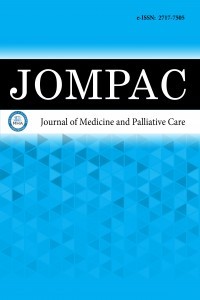
Journal of Medicine and Palliative Care
Yazarlar: Duygu KIRKIK KIRKIK, Faruk Berat AKÇEŞME, Sevgi KALKANLI
Konular:Sağlık Bilimleri ve Hizmetleri
DOI:10.47582/jompac.769064
Anahtar Kelimeler:EnSNP,In silico,Bioinformatics,CD40,Mutation
Özet: Introduction: Cluster of differentiation 40 is a type I transmembrane protein present on B cells, macrophages, dendritic cells, and endothelial cells, which leads to cell activation, proliferation, adhesion or differentiation. Previous studies have been shown that cluster of differentiation 40 polymorphisms have an effect on some autoimmune diseases. The purpose of this study is to investigate all single nucleotide polymorphisms found on cluster of differentiation 40 gene and their relationship with possible diseases by bioinformatics methods. Material and Method: In our study, while GeneMANIA was used to investigate the relationship between cluster of differentiation 40 gene with other genes, SIFT was employed to select sequences with similar functions as cluster of differentiation 40 gene. Exome cariant server was used for the detection of changes between populations and suspected single nucleotide polymorphisms. Mr single nucleotide polymorphisms Software was used to predict the effect of binding of 3’untranslated regions single nucleotide polymorphisms to miRNA. In order to analyze the untranslated regions on single nucleotide polymorphisms, UTRscan tool was used. UbPred was used for the estimation of the potential ubiquitination site on proteins, and Prosite was used to define the functional characterization of the protein domain. Results: In our study, a total of 85 single nucleotide polymorphisms were found for cluster of differentiation 40 gene, and rs147677886, rs11569321, rs7273698, rs11086998, and rs139300926 were detected as suspected single nucleotide polymorphisms. Moreover, these single nucleotide polymorphisms may be associated with multiple sclerosis (MS), rheumatoid arthritis (RA), and Kawasaki disease. Conclusion: Currently, there are no studies in the literature about single nucleotide polymorphisms of cluster of differentiation 40 gene that we detected by bioinformatics methods. In the future, we aim to evaluate this study experimentally in the laboratory and contribute to population-specific studies.